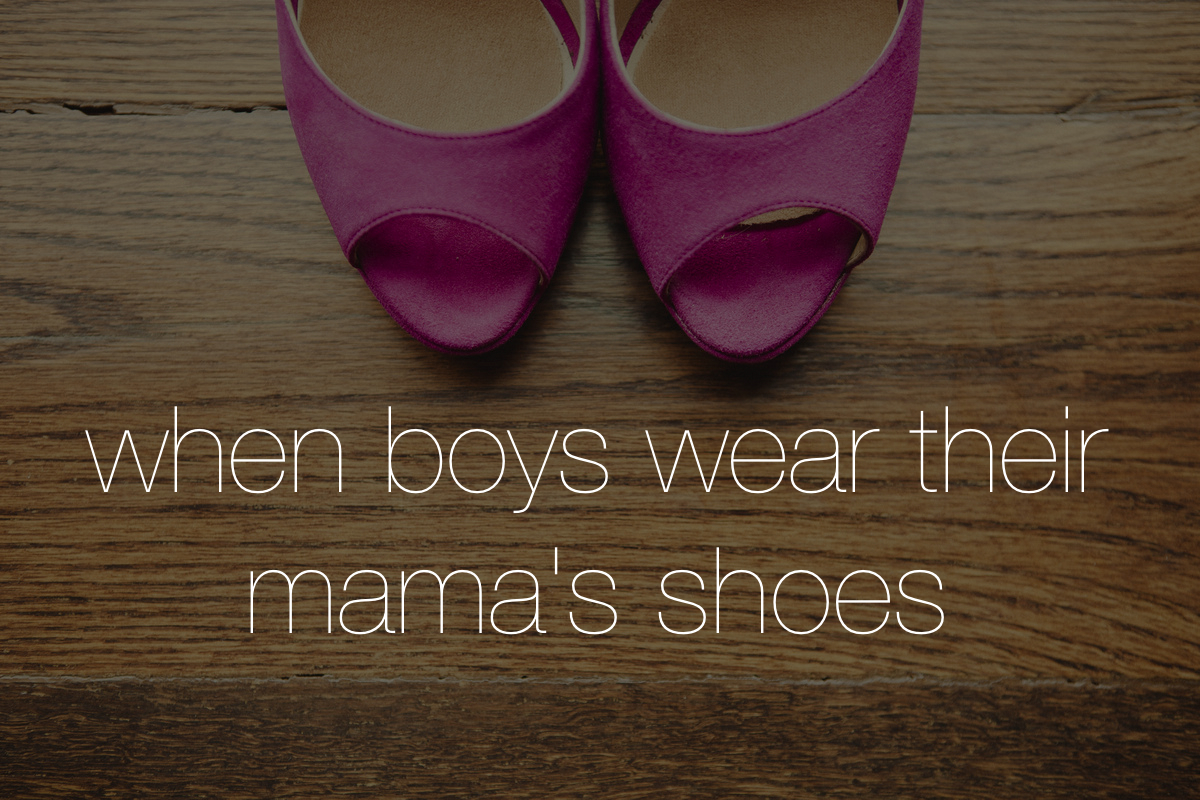The hype has calmed down a little bit and the bloggers have all weighed in. 50 Shades of Grey is a blockbuster movie, a bestselling book, and the hot topic of journalists, and reporters.
Viewing entries in
Culture
We recently went on a magical vacation with our family to Disney World. After the vacation we were talking to some of our friends about the experience and they asked, “How did you do it?”
Every year as we decorate the house to celebrate the Christmas season, I always make sure to get my menorah and put it out on the mantle. I usually also tell my wife that we should put it in the window so people can see, but I haven’t been able to convince her yet.
Every December, the warriors prepare themselves for the battle over Christmas. Loyal Christians fight the good fight by refusing to say, “Happy Holidays.” Others go to battle defending our right to call our trees “Christmas trees” instead of holiday trees.
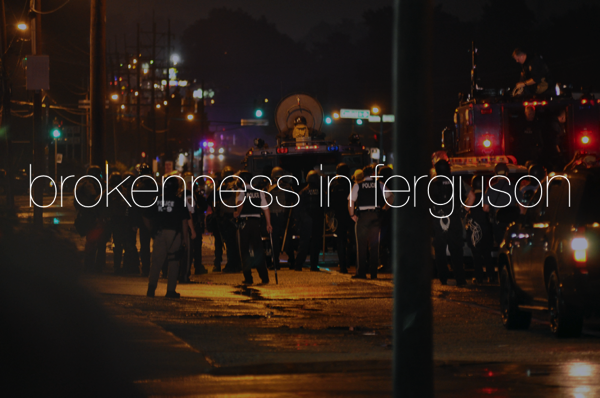 If you’ve been breathing the past two days, you’ve heard about the most recent decisions in Ferguson. The Internet has blown up with people tweeting and sharing their opinions, either infuriated by the decision or in support of Wilson’s testimony. People are hurting.
If you’ve been breathing the past two days, you’ve heard about the most recent decisions in Ferguson. The Internet has blown up with people tweeting and sharing their opinions, either infuriated by the decision or in support of Wilson’s testimony. People are hurting.
We live in a world where racial injustice still exists. Young black men often still live in fear in a way that I have never experienced. People’s businesses are being burned to the ground in light of the grand jury decisions. Police officers have to fear their lives as they try to bring about protection and peace to their cities.
We live in a broken world.
I’m not interested in talking about whether the Grand Jury decision was right or wrong. But I am interested in talking the implications this has for us as Christians.
President Obama suggested, "The problem is not a Ferguson problem; it is an American problem.” I think it’s bigger than that. It’s a humanity problem. The riots, the shootings, the racial tensions, and the lack of trust in the system is the symptom of a much deeper problem.
Things are not the way they are supposed to be. And people don’t know how to respond to this broken world.
Darkness is overwhelming a city. There is a darkness that exists in the racism that still takes place in this depraved and broken world. Ferguson showcases just how dark this world is. Suffering, especially when fueled by issues of race, is an especially painful and difficult darkness to walk in. Even if Officer Wilson’s shooting is him simply doing his job, the reaction of the country make it clear that a lot of people are hurting.
"Some need to spend less time insisting that African Americans shouldn't be upset and spend more time asking why some are." - Ed Stetzer's post, A Decision in Ferguson
What do we do in the midst of the darkness?
Martin Luther King said, “Darkness cannot drive out darkness; only light can do that. Hate cannot drive out hate; only love can do that.”
In the midst of the dark cloud that hangs over our country, what hope can be found in the midst of this kind of suffering? When families have to worry about their loved ones because of their job, where they live, or the color of their skin, what words of hope can give us something to hold onto?
Darkness doesn’t win. Evil doesn’t win. This tragedy will not win.
In the face of the great pain, God is hidden at work. When we are driven to our knees, the God who seems distant is actually present with us. When it seems like the world has turned against us, God is fighting for us. And when it seems like the accuser wants to destroy us, Christ himself stands in our place.
God cares more.
God knows more.
God does more.
"The light shines in the darkness, and the darkness has not overcome it.” - John 1:5
No amount of darkness, no matter how dark it is, can overcome the light. The light breaks in speaks Hope in a time when people feel hopeless. The light breaks in a brings life when people are losing theirs. And the light brings peace when peace doesn’t seem possible.
"The good news is that violence and distrust and animosity are not the last word. Christ, the Word made flesh who dwelt among us, full of grace and truth and life and salvation; Christ, whose death atoned for the sins of all humanity and whose resurrection trampled sin and Satan; Christ, the Prince of Peace—Christ gets the last Word.” - LCMS Blog
When it seems like the world has turned its back on them, people need to be reminded of the God who is for them.
As politicians, bloggers, and journalists all begin to weigh in, may God’s people be different. May God’s people be the kind of people that seek hope and reconciliation.
"God is not a tribal God, but the God of the world; that the gospel is for everyone; and that the church is one body that breaks down the walls of ethnicity, class, and nationalism that divide humans into warring camps.” - Paul Hiebert
May we be “the light of world.”
May we bring the light of Jesus into the dark places of Ferguson, Detroit, and our own neighborhoods. And may the love of Jesus heal the brokenness, light up the dark places, and bring peace to the restless.
As soon as the thanksgiving meal ends, the ads come out and the preparations for the next morning’s shopping begin. Once we’ve eaten our fill, it is time to plan out our Black Friday adventures.
I recently heard someone suggest that we shouldn’t call little girls pretty because it perpetuates a problem where little girls see their own worth based solely on their waist line.
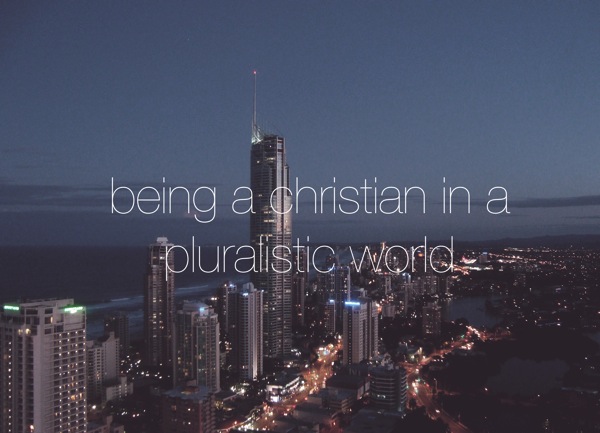 We live in a post-Christian, pluralistic world. We have atheist buddhists, catholic hindus, and agnostic muslims. Our world is one of smorgasbord religion. A friend of mine recently spoke at a conference about this very topic and pointed out that our world has brought about the first ever chur-mosq-agogue.
We live in a post-Christian, pluralistic world. We have atheist buddhists, catholic hindus, and agnostic muslims. Our world is one of smorgasbord religion. A friend of mine recently spoke at a conference about this very topic and pointed out that our world has brought about the first ever chur-mosq-agogue.
What is that?
How in the world is somebody Christian, Muslim, and Jewish at the same time? But this is the world we live in. In our neighborhoods, workplaces, and schools people are picking and choosing from the buffet of spirituality and figuring out their own thing.
Being in a post-Christian, pluralistic world means that we must understand that our culture is not shaped by the same values that many of us hold to as Christians. This means that our culture may be interested in spirituality but have some difficulty with the idea of an objective truth. As missionaries the message we have does not change, but the world that we go into is much different than it was even a generation ago.
Katy Perry resonates with this culture when she suggests:
“I'm not Buddhist, I'm not Hindu, I'm not Christian, but I still feel like I have a deep connection with God. I pray all the time—for self-control, for humility. There's a lot of gratitude in it. Just saying 'thank you' sometimes is better than asking for things.” - Katy Perry January 2013 Cover Story - Marie Claire
Our culture ultimately worships at the altar of self. They choose what works for them, when it works for them, and how it works for them. And because of this you get Catholics practicing a New Age mysticism, who are a little bit agnostic, but also believe in karma and re-incarnation.
It’s about whatever works for me.
This isn’t really completely foreign to the Scriptures; consider the mission that Paul has at Mars Hill.
“Men of Athens, I perceive that in every way you are very religious. For as I passed along and observed the objects of your worship, I found also an altar with this inscription, ‘To the unknown god.’ What therefore you worship as unknown, this I proclaim to you. - Acts 17:22-23
They are very spiritual and they are looking for something but they don't even realize what it is.
Doesn’t that describe our world? Our world is filled with people completely open to spirituality and the supernatural. And people are looking in all different places, religions, practices, and ideas for something that will help.
We live in a world full of people pursuing and building altars to all kinds of different gods. Some are actually connected to specific religions, others are simply a pursuit of wealth or fame. Both of which are often about worshipping one’s self.
And Paul says, “Let me tell you about the God you don’t know yet.”
And then he proclaims the hope of the Gospel. He proclaims the God who has made them his children. He proclaims the Good News of Jesus. And these spiritual, religious people who don’t know Jesus all of the sudden become Jesus followers. They didn't know what they were looking for and then Paul showed them exactly what was missing from their lives. The spiritual but not religious people all around us in our world are looking for Christ, they just don’t know it yet.
 Fantasy football is good for the soul. Well, it is good for my soul at least. For the past few years I have joined the world of grown men (and women) gathering together and building fictional teams, watching football, and following stats as though they actually were coaches of real teams.
Fantasy football is good for the soul. Well, it is good for my soul at least. For the past few years I have joined the world of grown men (and women) gathering together and building fictional teams, watching football, and following stats as though they actually were coaches of real teams.
And I love it.
I don’t have many hobbies that have zero connection to any work that I do. When I read, I prefer to read books by dead theologians. When I write, I write about the Bible. Even my technology use is usually connected to ministry activities.
But fantasy football is different.
When I get home from work on Sunday afternoons, there is not much better than turning on the game, following my team’s stats, and watching some football. Fantasy football is just for my enjoyment.
Fantasy football is refreshing.
In Exodus 31:17, the sabbath is described this way, "It is a sign forever between me and the people of Israel that in six days the Lord made heaven and earth, and on the seventh day he rested and was refreshed.” God enjoys his creation and describes it as refreshing.
Fantasy football is an opportunity for me to enjoy the good gift of God in NFL football. It is life-giving. And that might sound silly that fantasy football is life-giving, but it gives life in the simple fact that it is an opportunity to enjoy God’s gifts and to rest.
After a busy day like Sunday, football is an opportunity to unplug. Fantasy football for me is obviously about football. I love football. It’s obviously about cheering on the Lions and hoping for the best. It certainly is about getting my lineup set and seeing who I can pick up on waivers. But it’s about more than that.
It’s about the sabbath.
Abraham Joshua Heschel, a Jewish theologian wrote:
He who wants to enter the holiness of the day must first lay down the profanity of clattering commerce, of being yoked to toil. He must go away from the screech of dissonant days, from the nervousness and fury of acquisitiveness and the betrayal in embezzling his own life. He must say farewell to manual work and learn to understand that the world already has been created and will survive without the help of man. Six days a week we wrestle with the world, wringing profit from the earth; on the Sabbath we especially care for the seed of eternity planted in the soul. The world has our hands, but our soul belongs to Someone else. Six days a week we seek to dominate the world; on the seventh day we try to dominate the self.
Fantasy football for me is about disconnecting from work. It’s about disconnecting from the everyday toils and stresses and doing something that doesn’t matter and simply enjoying God’s great gifts of football, the internet, and TV (this might begin to sound like I ignore my family during football season, I don’t but I’m choosing to focus on football for this post).
The Sabbath is about being refreshed. And in being refreshed we are given life. And we find that life in enjoying the gifts that God has given to us in creation and in redemption. We enjoy gifts like football and the internet. We enjoy God’s gifts of our family. And we enjoy the gift of what God has done for us on the cross.
And so I play fantasy football. And I enjoy fantasy football. Because in it I enjoy God’s good gifts and it is refreshing and good for my soul.
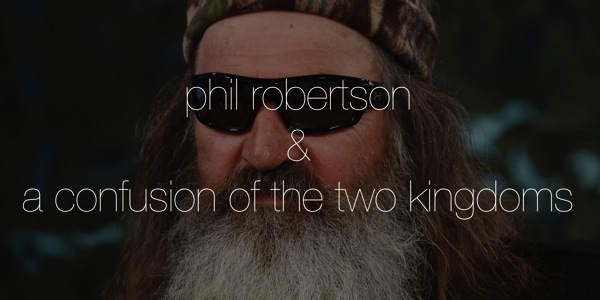 Duck Dynasty star, Phil Robertson, once again made news for the things that he’s said about politics and his faith. Now, obviously, this is also a large reason why he gets interviewed. People know that he is going to get attention and likely say something a bit out there.
Duck Dynasty star, Phil Robertson, once again made news for the things that he’s said about politics and his faith. Now, obviously, this is also a large reason why he gets interviewed. People know that he is going to get attention and likely say something a bit out there.
This time Phil offered his thoughts about the ISIS terrorists.
"In this case you either have to convert them, which I think would be next to impossible. I'm not giving up on them, but I'm just saying, either convert them or kill them. One or the other.” - Phil Robertson
Those who are not part of radical Islam are being told by ISIS, “Convert or die.” Phil Robertson’s solution sounds pretty similar.
It has not gone unnoticed that Phil is calling for a similar ideology of the terrorists.
Robertson’s solution of “convert or die” was a chilling echo of the ultimatum that Islamic State militants gave to Christians, Yazidis and other minority religious sects who live in their new “caliphate.” “Hundreds” of men have been killed for refusing to convert to the Islamic State’s extremist interpretation of Islam," Amnesty International reports. “Hundreds, if not thousands” of women and girls have been abducted and some may have been raped or forced to marry the fighters. - NY Daily News
A Confusion of the Two Kingdoms
As Lutherans, we have a beautiful doctrine that helps speak into these kinds of situations known as “the two kingdoms.” It could help correct Phil Robertson where he has gone wrong and at least help him more clearly articulate what he was trying to say.
Luther said this about the Two Kingdoms:
"God has ordained the two governments: the spiritual, which by the Holy Spirit under Christ makes Christians and pious people; and the secular, which restrains the unchristian and wicked so that they are obliged to keep the peace outwardly… The laws of worldly government extend no farther than to life and property and what is external upon earth. For over the soul God can and will let no one rule but himself.” - Martin Luther
There are, properly understood, two kingdoms. The kingdom of the right, which is the spiritual kingdom and the kingdom of the left, which is the world. The kingdom of the right is the Church and is made up of only Christians. It is ruled by God with grace and mercy. It is ruled by the work of Christ and calls Christians to do the same.
The kingdom of the left is also ruled by God, but the mean by which he rules is different. God rules the kingdom of the left through governments and other earthly authorities. The kingdom of the left protects all people and does so by the authorities that God has put in place. It rules with law instead of grace.
Luther also said:
"We are to be subject to governmental power and do what it bids, as long as it does not bind our conscience but legislates only concerning outward matters… But if it invades the spiritual domain and constrains the conscience, over which God only must preside and rule, we should not obey it at all but rather lose our necks. Temporal authority and government extend no further than to matters which are external and corporeal."
In other words, as Christians we live in both kingdoms. And as a part of the kingdom of the left, we submit to the authorities and laws of that kingdom unless they directly go against the kingdom of the right. And as a part of the kingdom of the left, we don’t take matters into our own hands to bring justice to evildoers but we rely on the authorities that God has put in place (unless the authority itself is the problem, i.e.: Hitler).
Phil Robertson’s Confusion
As Christians, we should desire that even the worst of people would be saved. As a part of the kingdom of right, we are called to love, pray for, and desire the salvation of everyone. This is where Phil spoke rightly when he wanted to convert the ISIS.
But Phil also gets himself into trouble when he suggests that if his conversion was unsuccessful that we should kill them.
The problem with this is not that they aren’t guilty and shouldn't be stopped, but in the “Convert or die” proclamation. What if a member of the ISIS converted to Sunni Islam, which is not a radical, extreme form of Islam? According to Phil’s statement, they still should be killed. According to Phil, it seems that only the conversion to Christianity counts.
I’m not sure Phil actually meant this, but this is why people freaked out. Because it echoes of the “Convert or die” tactics that led to what’s happening with the ISIS. They don’t care whether your are Christian, Jew, or Sunni, if you’re not their brand of Islam, they will kill.
So how do we respond as Christians to ISIS?
So what’s a Christian to do? Does the Christian seek the salvation of the ISIS? Does the Christian hope that the United States steps in to stop the ISIS? And can someone want a person’s salvation and their death at the same time?
When we properly understand the two kingdoms, we can actually answer yes.
Yes we want the ISIS to be saved. And yes we want them dead.
We want them saved because “God wants all people to be saved.” And we want them dead because justice says they need to die. Because it may actually be less loving to let them keep killing.
But here’s the catch, it’s not a “Convert to Christianity or else...” We can pray that there are family members who still have influence in the lives of the ISIS and that they will hear God’s truth. But we also pray that if special forces show up, they eliminate the threat.
We don’t pray that the special forces has Christians who want to evangelize to the ISIS. We pray that the special forces has Christians who have deadly accuracy as a sniper. We don’t pray that a group of Christians show up trying to convert them with guns in their back pocket just in case.
We pray in the tension that God’s two kingdoms would be at work. We pray that the kingdom of the left is at work rescuing God’s lost people, wherever they are found. And we pray that the kingdom of the right is at work protecting and caring for all of God’s creatures.
Luther understood this tension well:
…In the same way, when I think of a soldier fulfilling his office by punishing the wicked, killing the wicked, and creating so much misery, it seems an un-Christian work completely contrary to Christian love. But when I think of how it protects the good and keeps and preserves wife and child, house and farm, property, and honor and peace, then I see how precious and godly this work is; and I observe that it amputates a leg or a hand, so that the whole body may not perish…
…The office of the sword is in itself right and is a divine and useful ordinance, which God does not want us to despise, but to fear, honor, and obey, under penalty of punishment, as St. Paul says in Romans 13 [:1-5]… Martin Luther, Whether Soldiers Too Can Be Saved
I think every little boy at some point decides to walk around the house in his mama’s shoes. I’ve seen my son does this. He also likes to play with his toy vacuum. This past weekend he played with a dollhouse. And recently, he chose the princess band-aids for his pretend injury (although he later regretted not choosing the batman ones).
And get this, I don’t think he’s having a crisis with his masculinity or what it means to be a boy.
This is just what kids do.
With the exception of my Jordans, my wife’s shoes are always more interesting for a two-year-old than mine would be. And he likes to vacuum because he sees me vacuum. And he likes the princesses because my wife loves the princesses, his friends do too, and his little sister is bound to be a huge fan.
And that’s okay.
But it raises the inevitable question what makes a man a man? How do we define masculinity? And when we expand that question into the lives of our children, what makes a boy a boy or a girl a girl?Boyhood gets linked to things like sports and rowdiness. Girlhood gets linked to things like sensitivity and creativity. But what happens to the boy who is emotional or the girl who wants to wrestle with the boys?
Some might say that the girl is a tom-boy. Or that the boy likes girly things. Some might even go the lengths of saying they are having a gender-identity issue. I’d be more likely to suggest that we simply have a definition issue; the way the world often defines manhood and womanhood is based on purely superficial things.
So, what makes a man a man?
I’m not very “manly” by most popular definitions. I’m not good a shooting a gun, I know nothing about fixing a car, and I’m not great a physical labor. I know how to change a tire and pump my own gas but that’s about the limit of my car knowledge. I can’t tell you about the cars I see on the road, I tend to be emotional, and I love to kiss and cuddle with my kids.
The problem is our world defines masculinity with superficial things. It defines masculinity by sports, alcohol, cars, and guns. Or it defines masculinity by even more dangerous things for our boys like the objectification of women.
I once had a conversation with a young man who simply because of the fact that so many other guys watch pornography that it caused him to question himself in his masculinity. This wasn’t a gender problem or a sexuality problem, it was a definition of manhood problem.
The way we define manhood in our world affects the way that men see themselves. It affects the way husbands see themselves. And it affects the way our little boys (and teenage boys and young men) see themselves.s
So what is a man?
A discussion on manhood could fill up pages and pages of discussion. But for our purposes here, I want to talk briefly of what might be one way to think about what men should be pursuing in their own lives. It is what I want for myself and what I want to model for my son. And it is the way I hope that I will define masculinity as it goes beyond superficial issues and gets to the heart of what it looks like to be a man of God.
In Ephesians 5 Paul uses Christ as the model that men should look to in loving their wives when he says, "Husbands, love your wives, as Christ loved the church and gave himself up for her.” So if a husband is to love as God intends the manliest of husbands to love, it will look like Christ loved.
And therefore if we are going to teach our boys to be men, being a man is less about sports and guns and more about imitating Christ.
One of the ways that Jesus has been described throughout history has been having a three-fold office, basically this idea that Jesus related to people in three primary ways in his ministry.
Prophet.
Jesus was a prophet; he spoke God’s word to people. In Genesis, we see the failure of Adam as a prophet, when he fails to speak God’s words to his wife. And in Jesus, we see the opposite, Jesus perfectly speaks God’s word to us.
A man is called to speak God’s word in his home. He is called to be the mouthpiece of God to his family as he loves his wife and cares for his children. Are we teaching our boys to be God’s mouthpieces? Are we teaching them to speak God’s words in the context of our homes and in their relationships?
Priest.
Jesus was also a priest. He was the mediator who stood before the Father on our behalf. And he is the one who cares for us. Just as Adam in Genesis is given the job to care for and cultivate the garden, man is given the job to care for and cultivate his own family.
A man is called to care for, to love, and to grow his family. He is the shepherd that cares for his little flock. Are we teaching our boys to become pastors of their future homes? Are we modeling what it looks like to shepherd and disciple our own families? Are we caring not only for the physical needs of our families but their spiritual needs?
King.
Jesus was also known as the “King of Kings.” And as a King, Jesus protected his people. He was a warrior who went to battle for the sake of his people. When the devil raged war against Him, Jesus gave his life for us.
A man is called to be a protector of the family. While the priest shepherds and cares for the sheep; the King makes sure that the wolves get shot. A man protects his family and goes to fight for his family.
"Be watchful, stand firm in the faith, act like men, be strong. Let all that you do be done in love.” - 1 Corinthians 16:13-14
Are we teaching our boys to be protectors? Are we teaching them to fight for the things that matter? Are we teaching them to act like men, to be strong, and to do everything in love?
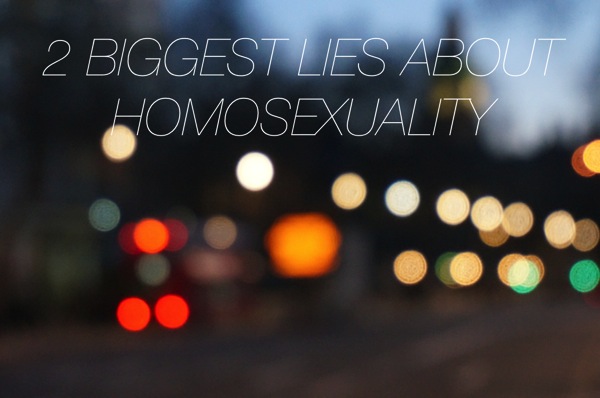 In our culture, the biggest problem and threat to the Gospel being preached to the homosexual community are the false beliefs that are perpetuated by both those within the community and those outside it. People within the homosexual community and outside of it often falsely belief that “they are not like us” and that “our sexuality is our identity.”
In our culture, the biggest problem and threat to the Gospel being preached to the homosexual community are the false beliefs that are perpetuated by both those within the community and those outside it. People within the homosexual community and outside of it often falsely belief that “they are not like us” and that “our sexuality is our identity.”
This is dangerous for us as we understand the message of forgiveness. This is dangerous for all the people throughout our country who come out to friends and family and falsely believe things about themselves and their identity that are simply contrary to what the Gospel proclaims. And I write this not to point out what those who struggle believe, but to primarily point out what many of us who don't struggle with this issue falsely believe.
The Two Biggest Lies People Falsely Believe
1. They are not like us.
This couldn’t be further from the truth. They are just like us.
In 1 Timothy 1:8-10, Paul describes the lawbreakers and the rebels:
We know that the law is good if one uses it properly. We also know that the law is made not for the righteous but for lawbreakers and rebels, the ungodly and sinful, the unholy and irreligious, for those who kill their fathers or mothers, for murderers, for the sexually immoral, for those practicing homosexuality, for slave traders and liars and perjurers—and for whatever else is contrary to the sound doctrine
In 1 Corinthians 6:9-11, Paul makes another list.
Or do you not know that wrongdoers will not inherit the kingdom of God? Do not be deceived: Neither the sexually immoral nor idolaters nor adulterers nor men who have sex with men nor thieves nor the greedy nor drunkards nor slanderers nor swindlers will inherit the kingdom of God. And that is what some of you were. But you were washed, you were sanctified, you were justified in the name of the Lord Jesus Christ and by the Spirit of our God.
But here is the point; we are all on these lists. Paul’s point in the list isn’t about calling out only homosexual behavior, but in calling out all of our sin. We are all the lawbreakers and the rebels. We are all guilty. And just for good measure, in case you don’t think you find yourself on the list, Paul even says “and for whatever else is contrary to the sound doctrine.”
That means anything that go against right belief.
So even if you are arrogant enough to think you aren’t on the list, he still adds the kicker to make sure you’re still counted as:
Lawbreakers. Rebels. Ungodly. Sinful. Unholy. Irreligious. Wrongdoers.
This is why Paul says, “All have sinned and fall short of the glory of God.” Because the Scriptures description of human nature makes it clear that we are all broken. It is clear that we are all guilty of sin. And that brokennness expresses itself differently in each of our lives.
For some brokenness gets expressed in our sexual behavior.
For others that brokenness gets expressed in greed or gossip.
In others, it happens in drinking.
Homosexual behavior is not a worse sin, but a different one. It simply expresses the same brokenness that is true of all of us differently.
This means that anyone who believes that they are a sinner in need of a savior can with confidence trust the words of Psalms 103:11-12 when it says, "For as high as the heavens are above the earth, so great is his love for those who fear him; as far as the east is from the west, so far has he removed our transgressions from us.”
When Ephesians says we are saved by grace through faith, that goes for all of us. We are all in the same boat. Our root problem is the same. And the grace we receive through faith is the same.
2. Our sexuality is our identity.
Sin is not our identity. It is not the identity of those who struggle with homosexual behavior, it is not the identity of those who support it, and it is not the identity of those who oppose it.
When your sin becomes your identity, you desperately need to hear the Gospel.
You are not what you do. You identity is not found in your own behavior, but is found in Christ who gave of himself on the cross. Your sin should be your identity, but because of the crucifixion your identity becomes that of a saint.
This is why 1 Corinthians 6 says, “That is what some of you were…” Because in Christ, no matter where you fall on that list, you are given a new identity in Christ. No matter who you are or what you’ve done, by faith your identity can be found in Christ. You are called a child of God because Jesus took on your brokenness and sin and made it his own.
You are not what you do.
You are not your sins.
You are not your relationships.
You are not your addictions.
You are not your sexual preferences.
You are not your career.
"So in Christ Jesus you are all children of God through faith, for all of you who were baptized into Christ have clothed yourselves with Christ. There is neither Jew nor Gentile, neither slave nor free, nor is there male and female, for you are all one in Christ Jesus.” - Galatians 3:28
Your identity is not found in any of these things. By the grace of God, we can find our identity completely outside of ourselves and in Jesus.
Because it can be hard to capture this in a short blog post, I encourage you to listen to a recent sermon I did on the subject. Even that leaves a lot that could yet be discussed, but I feel it is helpful in getting a fuller picture.
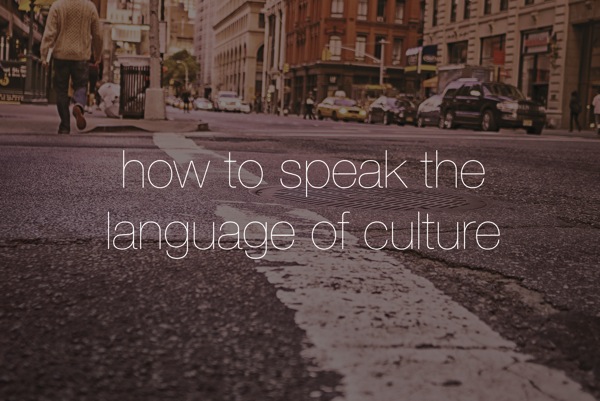 We are missionaries in our world. We have been sent with the promise of the Gospel to our broken world and are called to go into our neighborhoods, schools, and workplaces with the message of the Gospel. When a missionary enters into a foreign country, he must become a student of that foreign culture. The missionary must study the culture before he ever enters the country, he must learn their customs, their language, their dress, the people of influence, and even their social behaviors.
We are missionaries in our world. We have been sent with the promise of the Gospel to our broken world and are called to go into our neighborhoods, schools, and workplaces with the message of the Gospel. When a missionary enters into a foreign country, he must become a student of that foreign culture. The missionary must study the culture before he ever enters the country, he must learn their customs, their language, their dress, the people of influence, and even their social behaviors.
In missions what often happens for missionaries is that there is a level of excitement when entering the new culture that they have studied. But then not long after the initial excitement about the new mission work, reality sets in.
The realization dawns that this is now our home. Here our children will grow up as natives. And we must become one with these people with their unintelligible tongues and foreign ways before we can effectively share with them the Good News of the gospel. - Paul G. Hiebert. Anthropological Insights for Missionaries
In order to effectively share the message of the Gospel, the missionary has to become a part of the culture. They have to become a native.
The missionary needs to speak the language of the people.
A missionary is a translater. They translate the truth of the scripture into the language of the people. Whether that language be spanish, arabic, or english, missionaries are finding ways to translate the ancient truth into something that people can understand. In our culture, there is no shortage of people who haven’t heard the message of the Gospel.
The job of the missionary is to translate the Gospel message into the language of these people.
Speak it in a language they can hear, understand, and apply.
The missionary needs to be one of the people.
Knowing the right words isn’t enough. You can’t just know the language, you have to have the accent. When tourists show up in town, all the locals can spot them a mile away. They don’t look the same, they don’t talk the same, and the things they are interested in are completely different.
The tourist stage ends when we move from being outside visitors to becoming cultural insiders. This takes place when we establish our own homes, take responsibility for ourselves, and start making a contribution to the local community. - Paul G. Hiebert. Anthropological Insights for Missionaries
This isn’t to say that you have to agree with everything in the culture of the people you are trying to reach.
But it means that reaching the people in your culture is going to require more than dressing the part and learning some illustrations that prove you are culturally-savy. The missionary can’t just drop in with a mega-phone and start saying all the right words, the missionary needs time and relationships. The missionary needs to earn the right to be heard - a right that only comes through loving relationships with the people they are trying to reach.
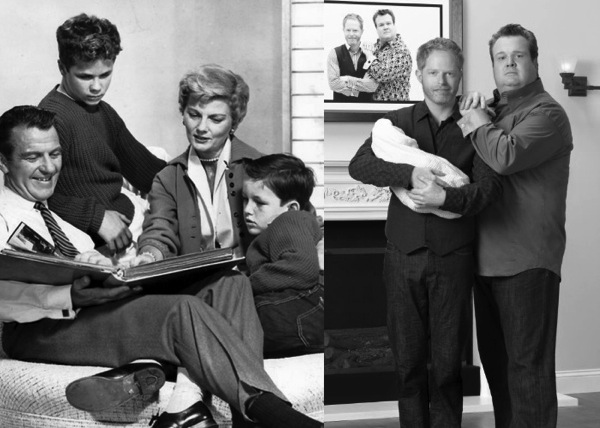 The world we live in is rapidly changing. The world my parents grew up with is not the same as the world I have grown up with. And it scares me to imagine the world that my kids will grow up with.
The world we live in is rapidly changing. The world my parents grew up with is not the same as the world I have grown up with. And it scares me to imagine the world that my kids will grow up with.
[tentblogger-youtube JPnG1-CbkYM]
Leave it to Beaver debuted in 1957, showcasing a young boy and his adventures around the neighborhood. The television show highlighted the life of the Cleaver family and typically showed Beaver getting into trouble and then facing his parents for reprimand and correction. What’s fascinating about the show to me is looking at it now 57 years later. What is shown on TV is simply nothing like what was on at that time.
Did you know the first episode of Leave it to Beaver almost didn’t air? It was too controversial.
Why?
Wall and Beaver in this episode purchased an alligator for $2.50 and needed to then decide to hide it so as not to be caught with a living alligator in the house. Then comes the conflict...
"We were going to put it in the toilet because we knew alligators needed water," Mathers said. "At that time, you not only couldn't show a toilet, you couldn't show a bathroom on television. It was prohibited.” - FoxNews Entertainment
And what about the sleeping arrangements?
June and Ward have two twin beds in their bedroom. In 1957, it was far too controversial to suggest that a married couple shared a bed together.
Fast forward to 2014...
[tentblogger-youtube 1aSzTVrP5FQ]
Things have changed a bit. And this isn’t to suggest that our world is going to hell because of shows like Modern Family. And certainly not to say that Modern Family is of the devil… I love Modern Family. But I just want to highlight, what is socially acceptable in our culture.
This can be scary depending on the world you grew up in.
But regardless it is important. Because the world we are trying to reach is a world that is growing up with Modern Family, Family Guy, and the Walking Dead. The commonly held values are changing, the way people talk are changing, and the way people understand right and wrong are changing.
But not everything is changing.
While culture changes, people really don’t.
The most basic needs that people haven’t are really any different. People still are born with the same problem. People are still all curved inward upon themselves and seek their own wants and desires. People still don’t naturally have the desire to choose the things of God. And people still seek to find hope, joy, and satisfaction in all kinds of things that are not God.
The difference in today’s culture?
People are okay talking about these things and sometimes even celebrating them.
But sin, that’s always been around. The sins that are being celebrated, these have always been around. There’s nothing new. People have the same problems and the same sins; culture is just revealing those problems in a new way.
And if people don’t really change, what people need is also the same. The message of our culture is the same message that was given for all cultures throughout history.
But when the fullness of time had come, God sent forth his Son, born of woman, born under the law, to redeem those who were under the law, so that we might receive adoption as sons. And because you are sons, God has sent the Spirit of his Son into our hearts, crying, “Abba! Father!” So you are no longer a slave, but a son, and if a son, then an heir through God - Galatians 4:4-7
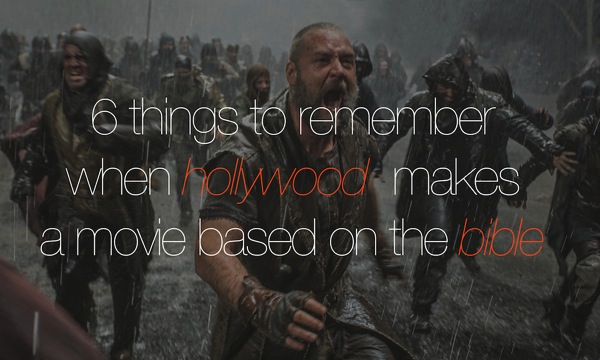 We are in a season where movies with biblical themes are being released like crazy. Son of God just got released. Noah is being released this week. Exodus is also going to be made into a movie and another will be made about Mary, the mother of Jesus. Hollywood all of the sudden realized that there is significant money to be made in the Christian audience.
We are in a season where movies with biblical themes are being released like crazy. Son of God just got released. Noah is being released this week. Exodus is also going to be made into a movie and another will be made about Mary, the mother of Jesus. Hollywood all of the sudden realized that there is significant money to be made in the Christian audience.
This can be both good or bad depending on how the production of these movies go. Because Noah is coming out this week and also has already been the center of all kinds of controversy, I wanted to gives us something to think about related to when Hollywood makes a movie based on the Bible.
[tentblogger-youtube AC8xVgiFglY]
6 Things to Consider When Hollywood Makes a Movie Based on the Bible
1. If you’ve read the book, the movie will never be as good.
This is always true whether it’s Harry Potter, The Hunger Games, or the Bible. People who are passionate about the original story are going to notice every point in which the film deviates from the original work. This is just the way that films are; in order for Harry Potter to be made into a movie, the screenwriter had to decide how to best tell the story on the big screen and unfortunately that means some things change. In order to make a movie like Noah, the screenwriter has to make some decisions about how he will tell the story.
2. It’s not going to be 100% accurate.
Some things are simply going to change as Darren Aronofsky had to adapt his story to make sense on the big screen. Noah was 600 years old when he built the ark; I’m pretty sure Aronofsky wasn’t able to cast a 600-year-old in the making of the film so it’s inevitable that the story on the screen will deviate at least slightly from the original. This isn’t meant to say it’s good or bad that it deviates, just the reality. Whether or not the deviations will harm the telling of the biblical story is yet to be determined.
"The film completely accepts the text, the four chapters in Genesis, as truth – just like if I was to adapt any book, I'd try to be as truthful to the original material as possible. It's just that there's only four chapters, and we had to turn it into a two-hour long narrative film.” - Darren Aronofsky
Update: Aronofsky also calls Noah the "least biblical movie ever made." This being said, he still says things like the previous statement.
3. A Biblically accurate movie can’t replace conversations.
Let’s say your unbelieving friends do decide that because of all the hype surrounding the new Noah film that they’d like to check it out. Even though they’re not into the whole Bible thing, the action of another end-of-the-world type film seems intriguing to them so they check it out. No matter how biblically accurate the film is, your friend isn’t becoming a Christian because of the movie. The story might be compelling, intriguing, raise important questions, and might even accurately portray the story of Noah, but it is not going to have the conversations that you need to have with your friends, neighbors, and co-workers about Christ. And if the movie isn’t biblically accurate, well, you’re going to need have conversations anyways, so why not have a starting point to the conversation.
4. Hollywood usually puts out garbage; this is a step in the right direction.
Magic Mike was a box office hit; Fifty Shades of Grey is sure to be at the top of charts when it comes out. And Noah… Paramount studios is putting a butt-load of money into promoting this movie so that it can be one of the best. Compared to Magic Mike or Fifty Shades of Grey is it really that bad, even assuming it’s not 100% accurate? Let’s even assume that it isn’t biblically accurate; a movie is raising spiritual conversations in an entertaining way and not just adding to the garbage already out there.
"Whatever extra-Biblical elements there are in the film, that doesn’t overcome the fact that Paramount Studios is spending hundreds of millions of dollars to produce and promote a Bible story. This will be a national conversation that millions will participate in, and Noah will be water cooler conversation for the next 6 months. What an opportunity for the Christian community! Instead of condemning it outright, let’s join the conversation. Rarely does an event come along that begs us to present our side of the story. But if we don’t see the movie, we’ll be wasting the opportunity.” - Phil Cooke, Hollywood Producer
The only way I could see this not being a step in the right direction is if the film is so off in the theology that it presents something that is completely contrary to the message of the Bible.
Update: I still haven't seen the film, but have heard a variety of opinions already. Here are a couple posts that seem to speak to whether or not this is indeed a step in the right direction.
- 4 Things I Liked and 3 I didn't about the new Noah Movie
- Is the Noah Movie actually Gnosticism?
- No, Noah is not Gnostic
5. Christian films aren’t exactly good either.
While the Christian film industry doesn’t put out garbage like Magic Mike and Fifty Shades of Grey, it is not exactly known for creating great films. On most days, I would rather take a Hollywood produced, high quality film based on a story from the Bible, over a poor quality, mediocre Christian film that teaches poor theology.
6. We should always be checking our sources anyways.
This isn’t just true of the movies we watch, but it should also be true with the books we read, the sermons we listen to, and the pastors we listen faithfully to. When the Apostle Paul taught the Berean Jews, how did they respond? Acts 17:11 says, "Now the Berean Jews were of more noble character than those in Thessalonica, for they received the message with great eagerness and examined the Scriptures every day to see if what Paul said was true.” This is the Apostle Paul we are talking about. He wrote most of the New Testament. And the Jews check their source to make sure what he was saying is accurate.
We should do this too. We should always be checking what our pastors say, what the popular authors are saying, and what the movies are teaching when they claim to teach the Bible. If you’re finding the inaccuracies in the movie, good… that’s what you should be doing if you are are a Christian.
What other thoughts come to your mind when thinking about Hollywood making your favorite Bible stories into films?







